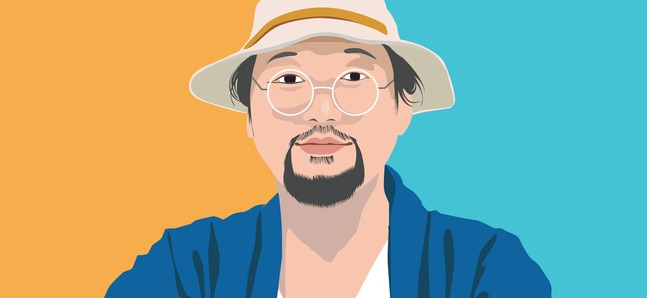
Illustration by Haruna Nitadori
Posted: Wed May 26 2010
Takashi Murakami’s newest venture, a gallery called Hidari Zingaro on the third floor of Nakano Broadway, opened in April 2010. On display – and for sale – are pieces of furniture, works of art and a selection of the more attractive bric-a-brac that he has come across during his travels. Hidari Zingaro will also be used as a platform for promoting new artists that have caught Murakami’s eye.
According to his Twitter threads, initial sales at the gallery are promising. In addition, is KaiKai Kiki Gallery (opened in Motoazabu in 2008) is currently home to a Friedrich Kunath solo exhibition. Murakami fell in love with Kunath’s work at first sight, and the exhibit is something of an open love letter to the youth of Japan, imploring them to check out Kunath’s creations so that they can fall in love with them for themselves.
We talked with Murakami at his art festival, Geisai#14. Murakami is an artist who is not only creating his own works, but also promoting the accessibility of creative power in the Japanese art scene.
This is the fourteenth Geisai. What do you make of the turnout?
TM: I tend to take the long view on these kinds of things, so I’m trying not to think too much about it! The important thing is that it doesn’t go bankrupt. I spent 750 million yen when we did Geisai #11, trying to make things run more as a company, but this time around I’m relying more on the good intentions and virtuousness of my staff. Well, what’s done is done, and it’s probably all for the best, but our mission now is to just keep the show going. I feel like our ideology is turning a corner this time around. The thing is there are all these restrictions and obligations that you have to deal with in the art world. For example, the literary world has its own literary circles and something like a ‘light novel’ doesn’t fit in very well with these literary circles. Now, our art is akin to the ‘light novel’. I realize that the idea of a new art, an art without restrictions and obligations, is an old idea, but I think we’ve been able to take that old idea and breathe some new life into it.
I would never have guessed in a thousand years that this is how things would turn out, but Geisai #14 has shrunk to about the same size as Geisai #1, you know, with the same number of booths. It doesn’t seem like much when you look at it, and I have a feeling that this is the direction we’re moving in. We’ll hold it twice a year – once in Japan, and once in Taiwan. I’ve said it before but, this is going to be the routine, and I’ll be happy if we can just keep going about it quietly.
I take it that Geisai has a whole different vibe in Taiwan?
TM: It’s an amazing show in Taiwan. But the show’s more or less over here in Japan; the participants have pretty much had their fill. Most are long gone. A few have stuck around, and I’m sure there are some who are sticking around only because they hope to be on hand to witness the demise of Geisai, but everyone keeps getting younger – which is wonderful. We have all these teenagers, acting all sophisticated, glibly discussing ‘concepts’ – and that’s exactly what I’m after. I honestly feel that in ten years time we can become an industry on par with the manga industry.
You usually come across as being somewhere about halfway between passionate and angry, but not today. What gives?
TM: I don’t seem angry today? I guess that’s because I’ve been in great spirits since stumbling upon Ustream and Twitter. I’ve been using and following them ever since. They’re great for keeping up with the latest gossip; there’s so much you can learn from everyone. Even little kids use them. It makes me think that maybe there’s still hope for Internet business.
But why do you like Ustream and Twitter so much?
TM: I’ve appropriated this idea from the cultural critic Hiroki Azuma, but it’s that the sense of transparency that accompanies receiving all of these posts in real time is a positive thing. And that’s really quite true. For example, I don’t spare the rod when I’m talking, so there’ve been a lot of cases where I’ve become the object of intense hatred when what I say ends up in print. But with Ustream, if people can get a feeling for the tone of what I’m saying, then this should help them interpret what it really is I’m trying to say.
Getting back to the idea of ‘stumbling upon’, you recently became a dog owner, didn’t you?
TM: Now, I really did stumble into that. Last year I was utterly exhausted, so I treated myself to a three-week holiday. I spent about two of those weeks making my way around Yakushima, Yoronto, and Kagoshima. While I was on Yoronto, a little Shiba Inu had been born who didn’t have anyone to take care of him, and so somehow he ended up with me. That’s my little Pom. Coincidentally I had read about his grandmother, Ken-chan, in a travel feature in Arne, about the Yoronto.
You’ve mentioned on Twitter that you give Pom cinnamon rolls. I’m not sure that’s the best idea; you should feed him something lighter.
TM: Why? Oh, but yesterday I gave him four cuts of meat from my kakuni (a braised pork dish), and he threw it all up. But… So you don’t agree with my theory that it’s more stressful for dogs if they have to sit there and watch you eat, and you don’t give them anything, even though it’s obvious that they want some too? OK, for example, let’s say there’s this guy who likes to drink and smoke. You’re in love with this guy, but you find out he has only two years left to live. Are you going to tell him that he has to quit drinking and smoking?
People can decide for themselves, but a dog’s completely different. What would you do?
TM: I’d tell him to keep doing what she wants. Maybe I’d preach at first. But if that didn’t work, I’d just start drinking and smoking with her. You see, one has to decide for him or herself whether or not one wants to live to a ripe old age. It’s a decision that one needs to make freely, and so you need to respect his or her decision. And if you can’t approve of the choice he or she makes, then you’re better off leaving, even if you know that that’ll seal his or her fate. But what about you? What would you do?
I guess I’d have to ask him to stop drinking and smoking.
TM: And so he’d end up denying himself the pleasure of alcohol and cigarettes, becoming a basket case in the process. What would you do if he left you as a result? If he got himself a new woman? Even though you were trying to look out for him? Don’t you see that happening?
No, I don’t really see that happening. And if that’s the choice he made, there wouldn’t be much I could do but accept it. By the way, that’s a cute hat you’re wearing.
TM: I designed it myself. I got it made at this hat shop in Aoyama called Kimiko. It happens to be second generation, this hat of mine. At first it was completely open up top. But I had them fix it up for me so that there’s this little window that only the part of my hair that’s done up like a dumpling can pop out through.
It’s getting to be that time of the year when one needs to worry about harmful UV rays, so I’m going to head to Kimiko and get myself a hat like yours. Thanks for your time, and thanks for the tip.
Takashi Murakami:
Takashi Murakami is a contemporary artist. His style, with its underpinnings of manga and similar subcultures has been extremely well received outside of Japan, with his works selling for hundreds of millions of yen at Sotheby’s. In addition to his work as an artist, he represents his artist management firm Kaikai Kiki, and manages his galleries Kaikai Kiki Gallery and Hidari Zingaro. He also continues to promote his art festival Geisai as a platform for new artists to showcase their work.
Tags:
Tweets
- About Us |
- Work for Time Out |
- Send us info |
- Advertising |
- Mobile edition |
- Terms & Conditions |
- Privacy policy |
- Contact Us
Copyright © 2014 Time Out Tokyo

















Add your comment